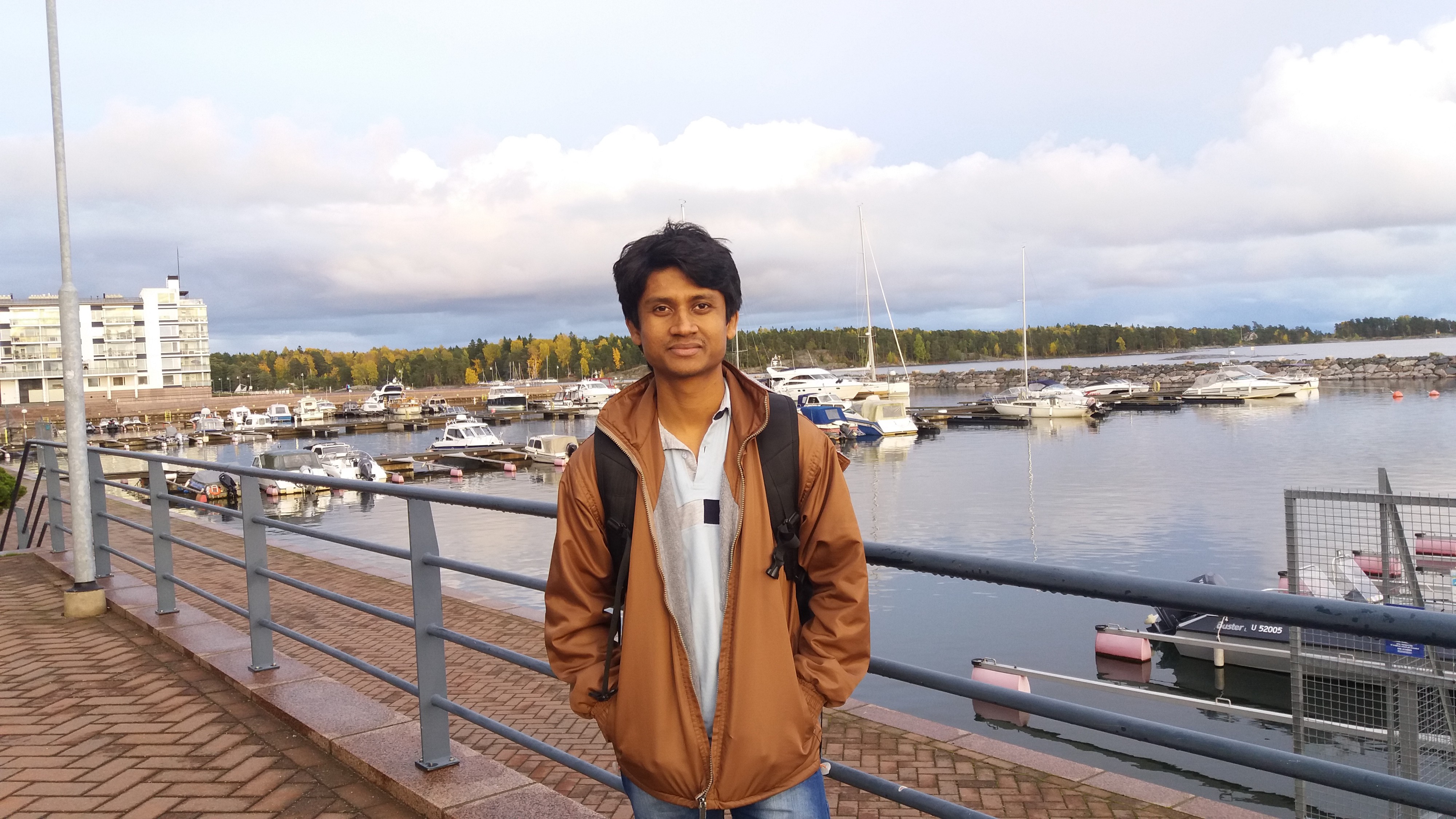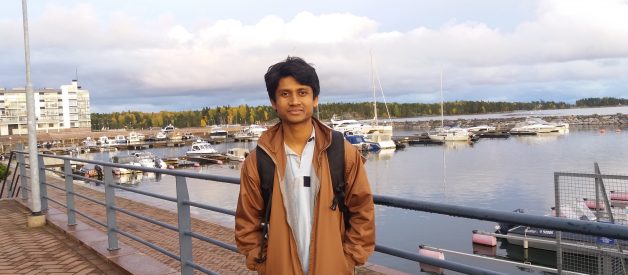
When I was a teenager in my home country, Bangladesh, perhaps the only piece of information I knew about Finland was that it is the country where Nokia phones were made.
Nokia 1100 and 3310 ? two of the iconic phones made by the company ? sold like hot cakes in Bangladesh back then. Nokia 3310 was widely hailed by its users, especially for its long battery life.
Videos From My First Finnish Karaoke Show
Passion is powerful
medium.com
After doing my bachelor?s in electronics and telecommunication engineering in Bangladesh, I worked as a journalist for over 3 years before coming to Finland to pursue a master?s degree in wireless communications engineering at the University of Oulu in 2016. Even though my field of study is technology, my passion is writing and I now work as a dishwasher in different Finnish restaurants in Helsinki, Espoo and Vantaa. If you find this divergence surprising, let me tell you that I also find it the same every so often.
This, however, is life for me at this moment.
Following are the 12 lessons I learned after living in this Nordic country for a year.
1) The virtue of being punctual
In Finland, everything happens on time. Here, 4pm means 4pm, not 4:02pm. If a programme/meeting is scheduled to begin at 4pm, it will begin exactly at 4pm. Finns rigorously practice punctuality and also expect others to do the same. Want to annoy a Finn? Be late and come up with excuses like you narrowly missed the bus/train!
I have seen my university teachers starting the lecture at 2:15pm because it was scheduled to begin at that time. I have also noticed teachers who come to the class 5?7 minutes earlier, sit on their chair and frequently look at the clock because they want to begin the lecture on time.
In Bangladesh, it is just the opposite. We expect people to be punctual but that usually does not happen. When someone is late to a meeting, we may have a hard time accepting this behavior but we have got used to thinking that it is OK. There are Bangladeshis who are repeatedly late and we jokingly call them ?perpetual latecomers?. We even have an adage in our native language: ?Noitar train koitai chhare?? The rough translation is: When will the train scheduled to leave at 9 o?clock finally leave?
2) Girls are noticeably safe in public places
The Bangladeshi society grapples with the perennial problem of street harassment of women, widely known as eve teasing. Eve teasing includes (but is not limited to) catcalling, molestation, groping and different forms of sexual harassment in public places. It is not completely safe for women in Bangladesh to go outside alone in the evening and at night. If they do so, they expose themselves to varying degrees of dangers, including rape.
On the contrary, Finland seems to be a safe haven for girls. I have NEVER seen any woman being catcalled even in busy public places. Women can dress and move as they please without facing any kind of overt verbal harassment.
What particularly struck me is how women travel by public transports at night and can still feel safe. I have noticed girls and women of different ages travelling by bus alone or in groups after midnight. I have seen young girls walking alone or walking their dogs on the street late at night. On weekend nights, it is not uncommon to see young Finnish boys and girls on the street. They giggle, they laugh out loud as they seem to have a pleasant time because it is viikonloppu!
Women living in societies where they have to constantly deal with the issue of safety know it very well that feeling and being safe in public places is nothing short of a blessing.
3) The Sun is very precious when it is elusive
Growing up in a tropical country like Bangladesh, I have always taken the presence of the Sun and sunlight in everyday life for granted. I am used to the idea that the Sun will rise in the morning and there will be daylight until it sets in the evening. Then when the night ends, it will rise again the next morning. This cycle will continue almost throughout the year. The only exception will be in winter when the Sun will not shine as vividly as it does during the rest of the year. Unlike Finland, autumn, spring and summer are not remarkably distinct in Bangladesh. Besides, the sun is always up there in the sky, no matter if it is autumn, spring or summer.
After spending my first winter in Finland, I realized why the presence of the Sun is thought to be so precious in this country. Winter in Bangladesh is short, say around 3 months. The usual temperature is between 10?15 degrees Celsius (This is the autumn temperature in Finland!). Even the winter can be fairly sunny in Bangladesh. Compared to summer, darkness descends around two and a half hours earlier during winter.
Compare this with the long Finnish winter when the temperature drops well below the subzero level, the Sun goes into hiding and darkness descends some 2 hours after midday. Oh, the thick layers of white snow covering roads all around come as an additional bonus. When this situation continues for a couple of months, you then feel profoundly how dear the Sun and sunlight can be.
As winter days passed, I waited eagerly when I will see the elusive Sun again. Like an army officer who cannot wait to kiss and hug his wife upon his return from a long mission abroad, I felt like I would embrace the Sun with all my love once it would appear up in the sky again.
4) Free Wi-Fi in public places brings great comfort
The indispensability of mobile phones in our everyday life need not be explained here. The Internet has made communications faster and easier. The convenience of using internet is greatly amplified when you can connect to free Wi-Fi hotspots in key public places.
In a country that is the first in the world to make broadband internet access a legal right for every citizen, it is not surprising to be able to enjoy free Wi-Fi connectivity in many of the places where you will need it the most, for example city centers. Also, you will not complain about the speed because it is satisfactory.
In capital Helsinki, the open network for public use offers speed that is fast enough for video streaming. The metro stations as well as the metro trains are equipped with free Wi-Fi connections also. With such a great internet infrastructure, you may not miss the next email when it hits your inbox.
5) Wherever you go, nature steals the show
Finland, which is a high performer in the areas of technology, sustainable development, good governance, gender equality and many more, is Europe?s most forested country. As much as 70% of the country is covered with trees and forests, allowing its residents quick and easy access to nature. The picturesque and scenic Finnish landscape looks so inviting, no matter which part of the country you live in.
Even in Helsinki, which is home to the biggest share of the country?s total population, it is possible to live close to nature. Here, if you want to take a stroll in the forest, you can. Finns grow up knowing that nature is never far away. The abundance of water is also a key feature of Finland, which is known to be the ?land of a thousand lakes?.
People in the Bangladeshi capital, Dhaka, and in many other parts of the country live in concrete jungles that lack greenery. After I arrived in Finland, it took me no time to fall in love with the beautiful Finnish nature. Moreover, there are myriads of health benefits of living around nature. A 2016 study published in the journal Environmental Health Perspectives found that living in greener areas could make people live longer.
6) Everything is organized everywhere
A couple of weeks after I arrived in Finland, I realized that everything works systematically in Finland. Public transports arrive almost exactly on time, and offices and businesses open and close according to the schedule.
Also, everything is fine and smooth as long as you follow the system. The delivery of public services is smooth and anomalies are rare (I have not experienced any personally). This makes everyday life very painless and you do not need to be worried about how things will work because you can rest assured that they will work somehow.
7) The choice of food is limited
One thing I badly miss every day in Finland is the great variety of spicy foods and vegetables available in Bangladesh. We eat (a lot of) rice, which is our main staple, with different curries, meat and fish, with many different spices being a key ingredient of all our cuisines. To us, spices make our foods mouth-watering.
But in Finland, foods are nowhere near spicy. Judging by Bangladeshi standards, vegetables in Finland are not cooked because cooking, for us, means adding spices to make it taste better. I have made attempts to get used to Finnish food but to no avail. An elderly Finnish lady in Oulu told me that Finnish foods have no color and taste.
Finns, however, have an appetite for foods that taste sweet. A variety of cakes, pies and desserts ? they are so sweet! I was not a very big fan of sweet items back home but now I eat such foods from time to time. Pulla and yogurt are something that I really like.
8) English is OK?but not OK
Perhaps this is true for every country in the world where English is not the official language. Finns are among the top speakers of English as a second language in the world. The sixth edition of EF English Proficiency Index released in 2016 ranks Finns as the 5th most proficient English speakers among 72 nations. In the big cities in southern Finland, it is not a very big problem if you do not speak Finnish. You can survive with English.
However, it is impossible to integrate into the society without knowing Finnish. Sure, you can speak English with the cashier at the supermarket or restaurant, ask for directions if you do not find a place and so on. But you cannot become part of the Finnish society if you do not know Finnish.
Tenaciously clinging to English and avoiding Finnish will continue to disappoint you if you want to stay in Finland for long. With English, you survive here as a foreigner but with Finnish, you begin understanding the society and its people. Learning Finnish plays a pivotal role in having better interaction with Finns. In addition, if you want to get a job in Finland, you must have adequate Finnish language skills. There is no better alternative, as far as I am concerned.
Finnish has earned notoriety for being one of the most difficult languages to learn. So, if you can learn Finnish, it is also a testimony to your resolve!
9) It is not only about coffee, but also about milk
Finnish people?s love for coffee is not a secret. They drink a lot of coffee or ?black stuff?, as one of my American friends calls it. According to the International Coffee Organization, the annual per capita consumption of coffee is 12.2 kg in Finland. This makes Finns the biggest coffee drinkers in the world.
But in addition to coffee, Finns have a great affinity for milk as well. After I came to Finland, I was so surprised to see that Finns drink milk with lunch. According to the Finnish Daily Nutrition Council, the annual per capita milk consumption was 123 liters in 2015.
There is no reason to think that milk is only drunk by Finnish babies. The council says 81% Finnish adults drink milk while 66% drink it daily. As I said before about the prevalence of sweet foods, it is no wonder that milk and dairy products have a significant presence in the Finnish diet.
10) Cars do not honk
It is no secret that having your own car gives you greater mobility. Also, when it comes to moving around in a sparsely populated country like Finland, a car is more than essential.
There is no shortage of cars on Finnish roads but the beauty is that they do not honk, as opposed to Bangladesh where car honk is one of the biggest sources of sound pollution every day. As a Bangladeshi, I know how car honks can drive you crazy on the road. Now I find it so amazing in Finland that there are so many cars but they do not honk to cause agony in my ears.
11) Expat Finns are easier to interact with
I have not met tons of expatriate Finns but such Finns, especially those who have lived in countries where the small talk culture exists, become more open and friendlier. During their overseas stay, they change in how they communicate and interact with others. Talking to strangers or making informal small talk about trivial subjects does not seem awkward to them. Moreover, they deeply realize that they no longer fit into the stereotypical definition of shy, reticent Finns once they return to Finland permanently or on a vacation.
A Finnish lady, who is a friend of mine, moved to Australia with her parents when she was a child. Having returned to Finland after many years, she could feel that she was no longer a true Finn. She describes herself as a half Finnish person. We were having a chat one day and she told me how a Finn became very annoyed when she inadvertently got close to her while taking a product from a shelf in supermarket. The person thought my friend had got too close and thus had crossed the boundary of Finnish personal space. To my friend, this was very awkward.
At my work, I met two young Finnish girls. A few moments after I talked to them, I guessed that they live or have at least lived abroad. I was right. One of them lived in the US for a year and the other has been living in Italy for 11 years. They were so extrovert during the whole conversation. They both agreed they no longer feel that the Finnish stereotypes are their natural characteristics. One of them even said she does not love the Finnish culture.
12) Silent Finland, a haven for writers
Finns do not talk much and perhaps their surroundings also follow the same rule. Even in big Finnish cities, it is possible to feel the ambience of peaceful countryside. It is also possible to experience tranquility in everyday life, and spend time in peace and seclusion. The silence may feel mysterious or even deathlike in the beginning but once you gradually get used to it, it can significantly improve focus, as I have felt personally. It is very simple ? the less noise you have around you, the more focused you are.
This quietness can prove very attractive to writers. It is no secret that the mind of a writer works best when all kinds of distractions can be avoided. Distractions are what keep writers from thinking clearly and articulating their thoughts in perfect detail. Finland, which is an oasis for calm and silence, can help writers become more productive and produce better contents.
This write-up was first published in Finland?s SixDegrees magazine here.


